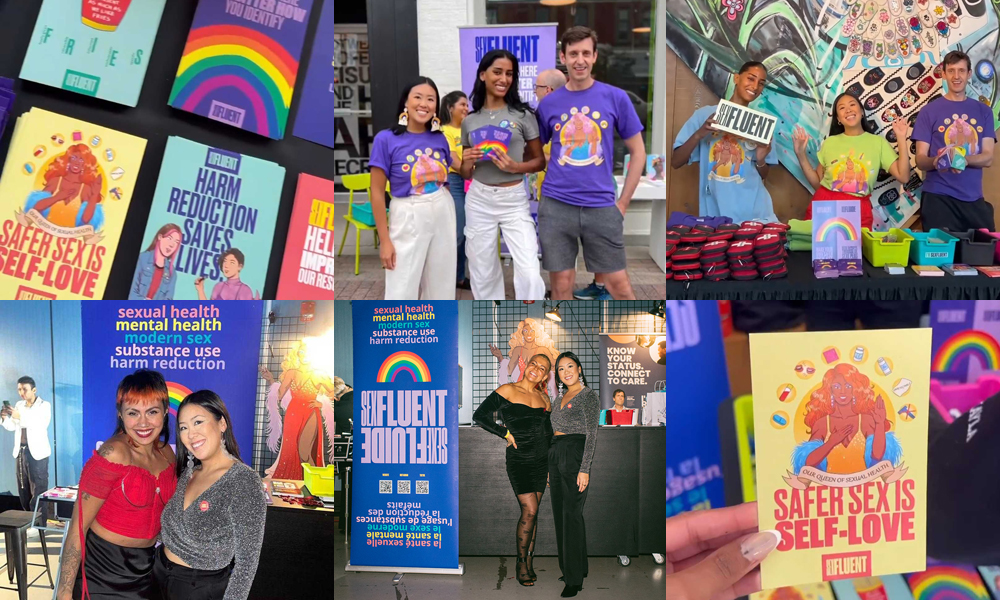Youth-driven platform harnesses the power of TikTok and Instagram to reimagine sexual health education to end the HIV epidemic…
Adolescents represent a growing share of people living with HIV around the world. That’s one of the reasons for the launch of Sexfluent.ca, an important youth-driven platform aimed at empowering youth to take ownership of their sexual health and ultimately ending the HIV epidemic in Canada
With the support of ViiV Healthcare Canada, the Canadian Foundation for AIDS Research (CANFAR) officially launched the youth-driven platform back in 2021, as part of their commitment to make a difference in the fight to end HIV in Canada. Sexfluent may approach things through a different lens, but the platform is making a difference. After all, HIV prevention education is so much more than just giving out information about HIV transmission and prevention, especially when it comes to young people. It’s about creating a culture of openness, acceptance and empowerment for youth to feel confident in their identity, sexuality and decision-making capabilities. That’s why Sexfluent is more than HIV information: the platform is a sexual health, mental health and harm reduction initiative that provides resources aimed at helping educate youth from a place of empowerment.
“Sexfluent intentionally takes a person-centred approach towards understanding and discussing sexual health, which makes our approach inherently comprehensive,” says Roxanne Ma, CANFAR’s vice-president for national awareness, who was the mind and lead behind the initiative. “We also intentionally de-emphasize the traditional anatomy-focused approaches to sexual health education as well as strive to actively challenge cis- and heteronormative narratives about sexuality. Because we are an HIV prevention program at our core, we actually centre queer sexuality and discuss sex, dating, relationships and health in a way that resonates more with 2SLGBTQIA+ youth as well as Indigenous youth, racialized youth, and youth who use drugs.”
Sexfluent also emphasize key topics like consent, healthy relationships, identity and sexuality, emotional intimacy and pleasure, communication, mental health and substance use, which Ma says aren’t traditionally discussed in sex education programs or alongside sexual health messaging. Before launching the platform, CANFAR conducted a national needs assessment and learned that these are the topics that young people actually want to learn about within sex-ed and HIV and STI prevention.
“We built Sexfluent directly to meet these needs and gaps. And the brand itself was built specifically in consultation with youth – down to the name itself, colours, font and everything,” says Ma. “I think an important feature that we do in Sexfluent is that we lift the veil behind so many taboo topics and actually give young people access to learn about them in a way that is non-judgmental but also promotes safety. I think a lot of sexual health education programs just don’t emphasizethe power of choice but rather push out generic and blanket messages about sexual health and HIV and STI prevention.
“I also think one thing that many people may be surprised about is that teenagers don’t know what HIV is or stands for; they’ve never heard of it. We were just up in the Yukon doing community outreach and there were rotations of high school students ranging from Grade 8 to Grade 12…and many of the students were asking us what HIV is. So, there’s definitely a strong generational gap in terms of pure awareness of HIV itself.”
Given the importance of destigmatizing conversations around sexual health, Sexfluent navigates cultural and societal barriers to create a judgment-free environment for individuals to explore pleasure and self-acceptance.

“We really do attempt to lift the curtain behind topics that many people are afraid to address or feel are too sensitive and may not view as being very relevant to sexual health. The reality is, young people and teens are not as sensitive as many adults may think because they’re exposed to so much more information on the internet at even younger ages than we ever were, and they want to have the space to talk about sensitive issues openly,” says Ma. “We’ve found that openly airing information in a way that’s accurate and doesn’t tell youth what to do, opens up their willingness to engage and receive this information.”
One example of a topic that young people have recently been very engaged in is sex work. And working in the HIV sector, Ma understands how the intersections of race, gender, social and economic positioning, mental health history, and experience or relationship with substances, might lead somebody to engage in sex work.
“We recognize that these are actually important topics that are at the intersections of what we healthcare workers recognize as producing risk, and [if] we engage in open discussions about these topics, then young people are immediately drawn to the content. I also think that talking about these topics more openly online gives people permission to engage in learning about these subjects. One thing that always struck me is that if people are uncomfortable having conversations about sex and safer sex – such as asking for condoms, asking about a partner’s status or testing history, and any of those things – then how are we to realistically expect that young people will implement safer sex practices even when they know the information?
“I think another key takeaway is that knowledge equals behavioural change. That’s why part of what we do and our strategy within Sexfluent is to slowly chip away at changing minds and perspectives about issues alongside education, so that people can personalize the information in a way that feels relevant and valuable to them.”
One of the ways that Sexfluent is engaging and educating Gen Z audiences about sexual health, including HIV prevention, is through TikTok. One of Sexfluent’s most successful TikTok series features street interviews with students on university and college campuses across Ontario asking for their perspectives on various sexual health- and identity-related topics as well as their knowledge about sexual health and HIV. It’s complementary to Sexfluent’s Instagram content, which is often “hot takes” posts, which are essentially bold statements that usually challenge pre-existing assumptions or normative/dominant perspectives in society about sex, sexuality, identity, HIV, drug use, mental health, consent, etc., and spotlight more progressive, forward-thinking and hopefully inclusive and positive perspectives on these topics.
“We’ve found that this type of content complements our educational posts very well and helps to continue making space for and accepting fluidity and grey areas around human and social concepts and experiences,” says Ma. “I love the videos with our ‘Sexfluent Squad’ [content creators that Sexfluent works with] and seeing them bring to life the scripts that we’ve worked together on.”
Seeing the growth of Sexfluent as well as the positive feedback it receives from youth is encouraging, and since the platform’s initial launch there have been countless opportunities to go beyond online and attend community events to present and showcase resources.
“I also enjoy seeing how we’re able to achieve a high level of engagement from youth in these conversations that we just don’t see happening anywhere else or that young people are engaging with overall. I’m just proud of our ability to provide a resource for Canadian youth to feel seen, supported and validated in their experiences,” says Ma.
For more information, visit www.sexfluent.ca or follow @sexfluent.ca on Instagram and TikTok.
To learn more about ViiV Healthcare Canada, visit www.viivhealthcare.ca.







POST A COMMENT